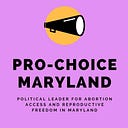A Discussion with Cecile Richards
By: Priya Hay-Chatterjee
Towards the end of the Fall 2019 semester at the University of Maryland, College Park (UMD), I attended a discussion and lecture by Cecile Richards, co-founder of the gender equity organization Supermajority and former president of the Planned Parenthood Federation of America. Following on the heels of a one-man, antifeminist demonstration that drew hundreds of upset listeners to McKeldin Mall, a landmark for progressive activism at UMD, Richards’ discussion and lecture returned a pro-choice and feminist voice to UMD.
I sat near the front of the lecture hall for Richards’ discussion with the Women’s Studies Department, and I assumed I would mostly be an observer in this talk. While I prepared to take notes, Richards noticed the feminist pins on my backpack and asked me what I was involved in. I was shocked that my work was the topic of conversation, but I had a brief conversation with Richards about my work on Naral ProChoice Maryland (NPCM)’s Emergency Contraception campaign, my Campus Organizing Guide, and the 2020 Maryland legislative session. Richards introduced herself to the other students near the front of the lecture hall, and when the talk started, both students and faculty asked questions about reproductive justice, politics, and inclusivity.
It was refreshing to hear a reproductive rights icon discuss the evolving reproductive justice concerns of young Marylanders. A student asked, “How do you get decision-makers to listen not just to you, but also to the disenfranchised people you work with?” Richards, like NPCM’s Executive Director, Diana Philip, often hears stakeholders and decision-makers asking her, “Where are all the young people?” For this reason, it’s crucial that young reproductive justice activists have a presence in the movement. Richards noted that reproductive justice organizations must make a point both to include and to listen to young people, or the movement could effectively go extinct. Politically, decision-makers who don’t actively listen to young people are not going to stay in office. Politicians care about remaining in office so they can make the change they believe in. To restore young people’s faith in democracy, Richards noted, we must also emphasize the importance of more tangible, local politics, and getting otherwise involved in local communities. Every general election cycle, roughly 16 million Americans are newly able to cast their vote for President. If we weren’t so politically apathetic, this number could sway both local and national elections by a landslide.
As an LGBTQ Studies minor, I was curious to know what Richards had to say about inclusion in sexual and reproductive healthcare. A student asked about the more evolved and contemporary reproductive justice framework of reproductive rights, and another asked about inclusion in sexual and reproductive healthcare (SRH), and Richards echoed the evolving non-gendered language in SRH. To make SRH inclusive, Richards suggests we get rid of labels such as “pregnant women” and replace them with “pregnant people.” While there is some adoption of non-gendered terminology in the world of SRH, Richards felt that language and direct services aren’t adapting fast enough, citing the alarming numbers of trans and gender non-binary people who know more about their health needs than their doctors do. Upon the opening of Planned Parenthood’s first clinic dedicated to providing trans care in Texas, appointments were fully booked for two months, proving an extreme need for non-stigmatizing SRH. If we as reproductive justice advocates feel that non-gendered language is not a priority, we must take a step back and look at the full spectrum of SRH.
One of the most important questions asked regarded international SRH and the common refrain: “We should be grateful we’re not in [developing country].” Richards noted that as Americans, the “most dangerous” thing we can do is backslide on our rights, because some other countries use us as a model for reproductive rights. During her later lecture, Richards noted that we need “North Star” states like New York and Maryland with legally protected abortion care access to lead the way for states hurting in SRH access and policy. In a sentence, Richards addressed the politicization of SRH, summarizing the hopes and dreams of the pro-choice movement: “Wouldn’t it be nice if we could just wake up every morning, open our health centers, and provide healthcare?”
Richards’ talk and lecture left me with much to consider and with a fresh, optimistic perspective. I asked her during the talk about how we can reframe the discussion around abortion as tragic and a necessary evil, shaping these discussions into abortion care as healthcare. Richards pointed out that it was a tactical mistake by Republicans to suggest defunding Planned Parenthood; by doing so, they brought Planned Parenthood into the spotlight. This spotlight has in recent years fueled a national campaign and movement to protect Planned Parenthood and abortion rights. Perhaps that spotlight brought me to reproductive justice, and perhaps it brought you to NPCM’s page.
